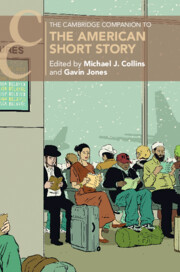Book contents
- The Cambridge Companion to the American Short Story
- The Cambridge Companion to the American Short Story
- Copyright page
- Contents
- Figures
- Tables
- Contributors
- Chronology
- Introduction
- Part I Contexts
- Part II Histories
- Part III People and Places
- Chapter 12 Native American Short Stories
- Chapter 13 African American Short Fiction
- Chapter 14 Little Postage Stamps
- Chapter 15 Regional Stories and the Environmental Imagination
- Chapter 16 Concrete Illuminations
- Part IV Theories
- Notes
- Further Reading
- Index
- Cambridge Companions to…
- References
Chapter 15 - Regional Stories and the Environmental Imagination
from Part III - People and Places
Published online by Cambridge University Press: 11 May 2023
- The Cambridge Companion to the American Short Story
- The Cambridge Companion to the American Short Story
- Copyright page
- Contents
- Figures
- Tables
- Contributors
- Chronology
- Introduction
- Part I Contexts
- Part II Histories
- Part III People and Places
- Chapter 12 Native American Short Stories
- Chapter 13 African American Short Fiction
- Chapter 14 Little Postage Stamps
- Chapter 15 Regional Stories and the Environmental Imagination
- Chapter 16 Concrete Illuminations
- Part IV Theories
- Notes
- Further Reading
- Index
- Cambridge Companions to…
- References
Summary
Even when valorized for a political imagination that drew attention to the marginalized spaces and communities of a rapidly changing postbellum United States, regionalism (or “local color”) literature was long considered to be merely minor: written from and about sites marginal to the centers of culture and power, primarily by women, and appearing most prominently in the modest form of the short story or sketch. This essay reframes the regionalist short story through a renewed attention to its environmental representation, especially by attending to the genre’s questions of scale: the relation between region, nation, and globe; modernity and its relationship to a preindustrial past; the limitations and constraints of a minor form. Through discussions of Sarah Orne Jewett, Mary Murfree, Bret Harte, and others, this essay argues that the regionalist short story’s environmental imagination decenters the human, while also revealing the co-constitution of a region and its literary archive.
Keywords
- Type
- Chapter
- Information
- The Cambridge Companion to the American Short Story , pp. 236 - 250Publisher: Cambridge University PressPrint publication year: 2023



